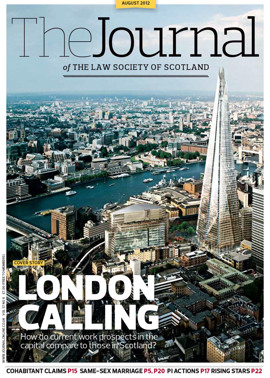Giving back
Lord Hodgson’s review of the English & Welsh Charities Act 2006, Trusted and Independent: Giving Back to Charities, was published on 16 July. It has a number of potential practical consequences for Scottish charities, including rejection “for the time being” of a single UK-wide definition of charity.
The review was triggered by a review mechanism built into the legislation itself, something that the Charities and Trustee Investment (Scotland) Act 2005 lacks.
Definition and devolution
Dealing with the Calman Commission’s recent conclusion that there should be a single, UK-wide definition, Lord Hodgson said that this was logically desirable, but that a large minority of respondents to his review were of the view that the “administrative irritation” of divergent definitions was a small price to pay for “diversity, flexibility and the upholding of principles of devolution”.
Writing from the English & Welsh point of view, Lord Hodgson states that “the differences only affect those operating in more than one jurisdiction”, but this ignores the fact that all Scottish charities must meet both the Scottish and English definitions of charity if they are to secure UK tax reliefs. While the differences are perceived to be minor and technical, they can and do give rise to real practical difficulties for some Scottish charities and those cross-border charities operating in Scotland.
Given the challenge of agreeing and implementing a shared definition and the lack of appetite for change in the devolved administrations, Lord Hodgson’s conclusion is that the least worst option is the status quo – but that a single, UK-wide definition remains desirable in the longer term.
Relief sanction?
Lord Hodgson’s review has also recommended financial penalties for English & Welsh charities that are late in submitting reports and accounts to the Charity Commission. Some of the proposed penalties could also – in theory at least – extend to Scotland. Sanctions to be applied should include the suspension of Gift Aid relief until reporting requirements are brought up to date.
However, a temporary suspension of Gift Aid would require adjustment to the charity tax relief rules and would be enforced by HM Revenue & Customs (HMRC). Since Gift Aid (like all tax reliefs) is a matter reserved to Westminster, suspension of Gift Aid, if introduced, would normally be expected to apply across the UK, affecting Scottish charities as well as those south of the border. That is unless legislation specifically confined this penalty to England & Wales alone.
Other notable changes
Some of the other recommendations proposed include limiting charity trustees’ terms of office to three terms of three years, integrating Charity Commission and HMRC applications into a single process, and the ongoing simplification and improvement of the Charities Accounts Statement of Recommended Practice (SORP), to which all UK charities are subject. The revision of thresholds for accounting and audit purposes south of the border is likely to be viewed with some interest in Scotland, particularly if the intention is to maintain consistent thresholds across the UK for practical accounting purposes.
Lord Hodgson’s report has instigated a fair amount of debate in the charity sector, not least in relation to the remuneration of charity trustees. The ongoing discussion on these topics and on Lord Hodgson’s report as a whole is likely to be followed in Scotland with some interest.
In his review, Lord Hodgson expresses the hope that his report will result in “sensible, measured and genuine reform” guided by principles of transparency, proportionate and comprehensible regulation, and a focused, practical and affordable regulatory structure.
Will Scotland have a similar review of its charity legislation? The Office of the Scottish Charity Regulator (OSCR) in its earlier annual reports certainly expressed the hope that this would happen, but there is limited time in the Scottish Parliament for a wide-reaching review. The idea of a five or even 10-year review seems to be off the cards for Scottish charity legislation, but the Scottish Government has indicated that this is not a permanent state of affairs and the 2005 Act is likely to be reviewed in the longer term. That may yet be some time away.
In this issue
- Trapped by the Wildlife Act?
- What constitutes "reasonable endeavours"?
- Reflective learning explained
- Values to the fore
- Employee ownership: removing the barriers
- Reading for pleasure
- Should you be paying your interns?
- Opinion column: John Deighan
- Book reviews
- Council profile
- President's column
- Edinburgh's history unveiled
- Capital connection
- Cohabitees and the principle of fairness
- Coulsfield cloned
- A plea in law for equal marriage
- Aiming high: rising stars
- Get your facts right
- Pension rights and TUPE transfers
- 2014: an ET odyssey
- Giving back
- ILG to mark 40 years in style
- Rural lessons for urban conveyancing
- Investing in our own futures
- Training the flexible way
- Business radar
- Code of conduct for MHT work
- Law reform roundup
- The threat from within
- Ask Ash
- The learning curve






